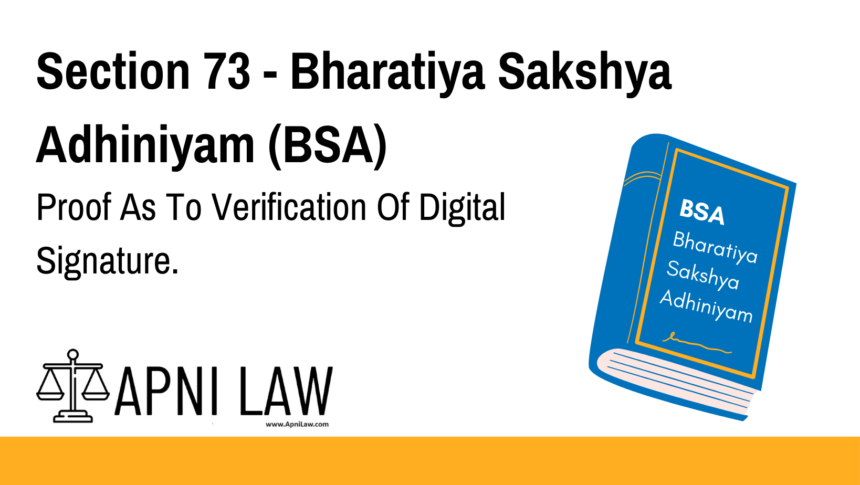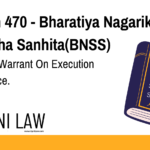Code: Section 73 – Bharatiya Sakshya Adhiniyam, 2023 (BSA)
In order to ascertain whether a digital signature is that of the person by whom it
purports to have been affixed, the Court may direct—
(a) that person or the Controller or the Certifying Authority to produce the
Digital Signature Certificate;
(b) any other person to apply the public key listed in the Digital Signature
Certificate and verify the digital signature purported to have been affixed by that
person.
Explanation of Section 73 BSA
Section 73 of the Bharatiya Sakshya Adhiniyam, 2023 empowers the Court to verify the authenticity of a digital signature during any legal proceeding. As digital communication and electronic records become increasingly common in both civil and criminal matters, this provision ensures that only valid and verified digital signatures are accepted as evidence.
Under this section:
- The Court may direct the concerned individual, or the Controller or Certifying Authority (as recognized under the Information Technology Act), to produce the Digital Signature Certificate (DSC).
- The Court may also authorize any other person—usually an expert—to use the public key contained in the DSC to verify the authenticity of the signature.
This verification process strengthens the admissibility and reliability of electronic records.
Illustration
Example: Verifying a Disputed Digital Signature
A company executive denies signing an agreement submitted in the form of an electronic record. To verify its authenticity, the Court may:
- Ask the executive or the Certifying Authority to submit the Digital Signature Certificate.
- Appoint a digital forensic expert to apply the public key from the DSC to the signature on the document.
If the public key matches, the Court may treat the digital signature as valid.
Common Questions and Answers on Section 73 BSA
1. What is a Digital Signature Certificate (DSC)?
A DSC is an electronic certificate issued by a licensed Certifying Authority that confirms the identity of the individual who owns the digital signature and links it to a public key.
2. Can the Court demand a DSC?
Yes. Section 73 gives the Court the authority to direct the individual, Controller, or Certifying Authority to produce the certificate for verification purposes.
3. Who verifies the digital signature?
The Court may appoint any suitable person, usually a digital expert, to verify the signature using the public key in the DSC.
4. What happens if the digital signature is not verified?
If the signature fails verification, it may be treated as unauthentic and the document may lose its evidentiary value.
5. Is this section relevant only to civil cases?
No. Section 73 applies to any judicial proceeding, including civil, criminal, and administrative matters where digital signatures are in question.
Conclusion
Section 73 of the Bharatiya Sakshya Adhiniyam provides a critical mechanism for verifying the validity of digital signatures, ensuring that electronic evidence meets the standards of reliability and authenticity required in court. This provision supports the increasing reliance on digital documents and strengthens the legal framework for electronic evidence in India.
For more detailed legal insights and updates, visit ApniLaw.








